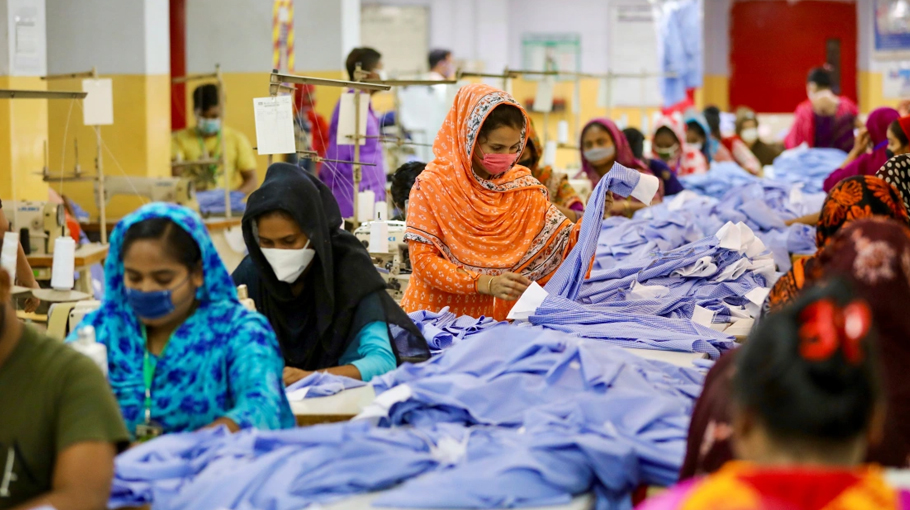Blessing in disguise for RMG
Global uncertainty may shoot up Bangldesh export

The global economic and political crisis has become a boon for Bangladesh. Inspired by the rising trend in receiving orders for ready-made garments or RMG, many businessmen predict earning record (34+ billion) foreign exchange alone from RMG this year.
Many buyers of readymade garments are taking the opportunity of poor economic growth in countries where they are struggling to manufacture and supply products on time.
Many are canceling their orders from different Asian countries and re-issuing orders to Bangladeshi garment manufacturers.
It is informed that the global political turmoil of the Russia-Ukrain war and the Covid-19 pandemic has forced many Asian countries like China, Sri Lanka, Pakistan, India, Myanmar, Laos and Vietnam to turn down mega orders.
More than half of Sri Lanka’s total export trade, or 6 billion, comes from garments. The country's economic crisis is now at an all-time high. Despite the state of emergency and curfew, the government has not been able to keep people at home. In this situation, normal production activities in the country are being severely disrupted.
On the other hand, Pakistan's half of export earnings - about USD 10 billion come from readymade garments. If the country's political crisis is prolonged, exporters think that many buyers will come to Bangladesh from there. Many buyers have already moved to Bangladesh due to the long-running political crisis in Myanmar.
In such a reality, garment buyers from the United States and Europe are seeking opportunities in Bangladesh. Garment exporters are expecting most of the buyers from the countries to come to Bangladesh if the crisis is prolonged.
Recently, due to the new lockdown in China, many purchase orders of readymade garments have been shifted to Bangladesh. Not only China but also Vietnam and Cambodia are on the list of countries from where buyers are shifting to Bangladesh.
During the 9 months (July-March) of the current fiscal year 2021-22, USD 17.12 billion of foreign exchange came from this sector. Exports increased by 35.30 percent over the same period last year.
In the last 9 months, the foreign exchange earned by exporting woven garments has been USD 14.31 billion. In a single month, Bangladeshi exporters brought in USD 4.6 billion (Tk 476.22 crore) in foreign exchange by exporting various products in March.
Envoy Group Chairman Qutbuddin Ahmed, one of the top garment exporters in the country told the media that part of the Sri Lankan purchase order is coming to Bangladesh - it is 100 percent sure. What will buyers do? They will not wait till the uncertainty is over. If the situation continues like this, if the economic instability is prolonged, then they will definitely go where they are assured.”
The information in the review of Bangladesh Bank is also in line with the demands of the garment industry owners. Regular reports are published from the External Economics Branch of the Research Department of the Central Bank entitled Marginal Review of Readymade Garments.
According to the report, despite the increase in exports in June 2021, the pace was slow. That pace began to pick up in September. Exports were also much more encouraging last December. After the global lockdown has eased, buyers are gradually shifting their purchases to Bangladesh.
The report found that major US giants were decentralizing their presence. The purchases that used to go to China, Vietnam and Cambodia are now coming to Pakistan, India and Bangladesh. In this context, the factories of Bangladesh are getting huge purchase orders from the United States. Bangladesh’s garment exports to the US market also increased by more than 40 percent in January.
The Chittagong Chamber of Commerce and Industry director and former BGMEA Director Anjan Shekhar Das told Bangladesh Post, “It’s true we are having huge work orders but buyers are not increasing price. However, to accept huge work orders we also need to have some preparation. Our ‘Ease of doing business’ and ‘Cost of doing business’ should be more business-friendly.”
For example, he showed, that most of the raw materials for RMG sector largely come from abroad, on the other hand, gas supply has been made limited for the industry. In this situation, continuous operation in factories becomes a challenge for them.
Meanwhile, he also said that the HS Codes or Harmonized System Codes have become another headache for them. For instant, Anjan said, “Earlier we used to import similar goods under a common HS code but when we go to export, each product will require a different HS code.”




